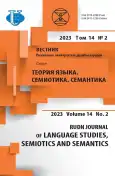Poetic Word in the Light of L.A. Novikov's Teaching on Aesthetic Perception
- Autores: Danich O.V.1, Druzhina N.L.1, Maslova V.A.1
-
Afiliações:
- Vitebsk State University n.a. P.M. Masherov
- Edição: Volume 14, Nº 2 (2023)
- Páginas: 502-513
- Seção: LITERARY TEXT LINGUISTICS
- URL: https://journal-vniispk.ru/2313-2299/article/view/323442
- DOI: https://doi.org/10.22363/2313-2299-2023-14-2-502-513
- EDN: https://elibrary.ru/MVVVSP
- ID: 323442
Citar
Texto integral
Resumo
The subject of the study is the poetic word as a special kind of aesthetic instrument. The aesthetics is the universal relation of a person to the world, to himself, to art in general, and to the poetic text in particular. The purpose of the research is to establish the relationship between tradition and new ideas in L.A. Novikov's concept of language as art; to identify the specifics of the implementation of the aesthetic function of language in poetic texts. The methodological basis was the works of L.A. Novikov, M. Gasparov, R.O. Yakobson, and M.M. Bakhtin. Poetic texts of classical and modern authors were chosen as the material for the study. The research shows that the aesthetic meanings in the poetic text go beyond the meanings of the words used in the poem. On the examples of the poetry of M. Tsvetaeva and modern poets E.K. Olshanskaya and D.M. Burago we demonstrate a non-linear vision of the world, which provides an aesthetic effect. L.A. Novikov’s theory of the ornamental field and the theory of the aesthetic in language helps to understand the mysterious poetic meanings (connotations, subtexts, with the help of which the reader completes or transforms the author’s poetic image). The conducted research allowed us to draw the following conclusions: language is an object of aesthetics and a means of creating by the author a multidimensional reality, which is cultural; a full-fledged aesthetic perception of poetry is provided by the personality of the author himself, the phenomenon of the text (its motives, the palette of language means and techniques), the personality of the reader, the type of culture, etc.).
Sobre autores
Oksana Danich
Vitebsk State University n.a. P.M. Masherov
Email: odanich@mail.ru
ORCID ID: 0000-0002-8888-0107
Scopus Author ID: 57225221302
PhD in Philology, Associate Professor, Associate Professor of Department of Preschool and Primary Education of Educational Establishment
33, Moskovskiy avenue, Vitebsk, Republic of Belarus, 210038Natalya Druzhina
Vitebsk State University n.a. P.M. Masherov
Email: natalia.druzhina@mail.ru
ORCID ID: 0000-0002-2561-9489
PhD in Philology, Associate Professor of the Department of World Languages of Educational Establishment
33, Moskovskiy avenue, Vitebsk, Republic of Belarus, 210038Valentina Maslova
Vitebsk State University n.a. P.M. Masherov
Autor responsável pela correspondência
Email: mvavit@tut.by
ORCID ID: 0000-0001-8717-9231
Scopus Author ID: 57222509849
Doctor of Philology, Professor, Professor of the Department of Preschool and Primary Education of Educational Establishment
33, Moskovskiy avenue, Vitebsk, Republic of Belarus, 210038Bibliografia
- Gasparov, M.L. (1997). Selected works: In 3 vols. Moscow: Yazykirusskoikul'tury. (In Russ.).
- Novikov, L.A. (2001). Aesthetics and semiotics of A. Bely's ornamental prose. Moscow: RUDN publ. pp. 319–363. (In Russ.).
- Makovskii, M.M. (2011). The phenomenon of taboo in the traditions and in the language of the Indo-Europeans.Essence — forms — development. Moscow: Librokom. (In Russ.).
- Garsia Lorka, F. (2006). The song wants to become light …. Moscow: Azbuka-klassika. (In Russ.).
- Novikov, L.A. (2001). On the study of the language of fiction. Moscow: RUDN publ. pp. 176–212. (In Russ.).
- Novikov, L.A. (2001). The development of a verbal image in a literary text. Moscow: RUDN publ. pp. 166–175. (In Russ.).
- Bakhtin, M.M. (1975). Questions of literature and aesthetics. Moscow: Khudozhestvennaya literatura. (In Russ.).
- Novikov, L.A. (2001). The phenomenon of the aesthetic in language. Analytical synthesis experience. Moscow: RUDN publ. pp. 17–36. (In Russ.).
- Novikov, L.A. (2001). Meaning as an aesthetic category of language. Moscow: RUDN publ. pp.37–55. (In Russ.).
- Vygotskii, L.S. (1999). Thinking and speaking. Moscow: Labirint. (In Russ.).
- Maslova, V.A. (1987). Poetic text as a means of aesthetic education // Actual problems of aesthetics and aesthetic education in the light of the decisions of the XXVII Congress of the CPSU. Minsk. pp. 136–138. (In Russ.).
Arquivos suplementares









